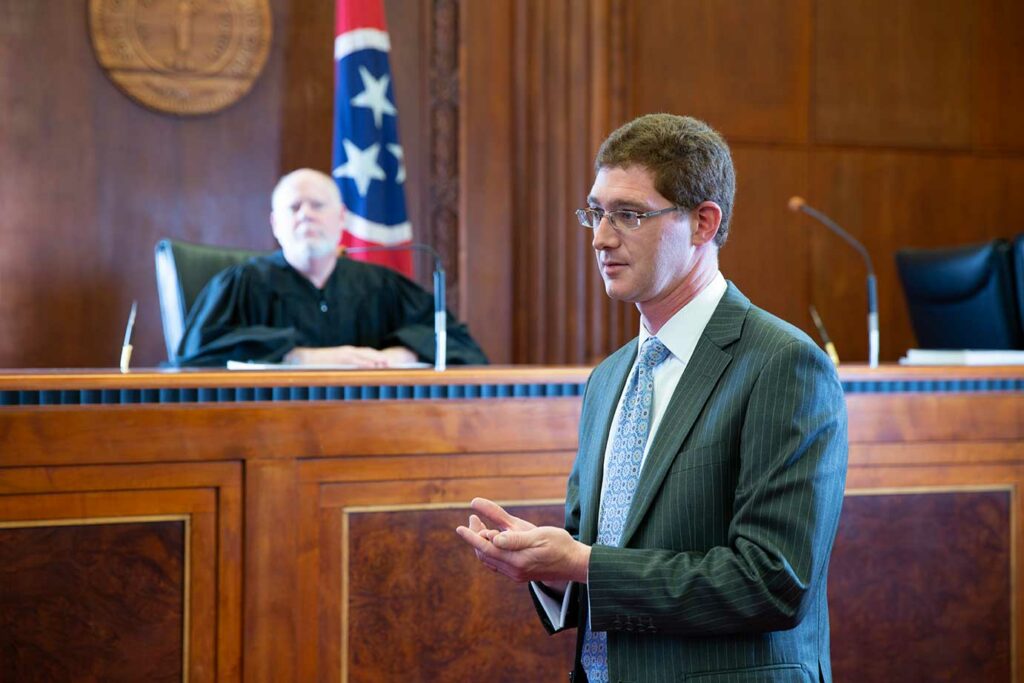Constitutional Rights: Joshua Hedrick in the News
In the trial of six policing reform advocates arrested nearly two years ago, major constitutional issues have arisen. Josuha Hedrick represents one of those defendants. KnoxNews.com is covering the January 2023 trial.
“Valentine’s attorney, Joshua Hedrick, argued enforcing the statute would be appropriate at a funeral, but not at a public meeting. The demonstrators should be viewed simply as citizens who wanted their government to address the problem of a child shot and killed at school, Hedrick said. “We can debate that issue, but we cannot debate whether that is a problem, that citizens should be allowed to go to their government and say, something should be done,” Hedrick said, citing civil rights activists like the Freedom Riders and Rosa Parks. “To criminalize that is contrary to rights granted by our constitution.“
(Emphasis added.)
Here is the full article:

KEY POINTS
- Two constitutional issues have arisen in the trial of six policing reform advocates arrested nearly two years ago.
- Prosecutors say the right to assembly was threatened by the demonstration at a county commission meeting.
- Defense attorneys say the right to petition the government for redress of grievances was threated by the arrests.
- A Knox County judge has delayed the trial of the six activists to take time to sort out the constitutional arguments.
The trial for the Knoxville police reform advocates arrested at a county commission meeting nearly two years ago has been delayed by arguments over whether the demonstration and subsequent arrests are constitutional.
The demonstrators, led by the Rev. Calvin Skinner and activist Constance Every, garnered headlines when they were arrested at a Knox County Commission meeting in April 2021. They were demonstrating for policing reform after a Knoxville police officer shot and killed Anthony Thompson Jr., 17, inside his high school.
Law enhanced penalties for disrupting public meetings
The constitutionality of the arrests has been a subject for debate from the very beginning.
When the case was filed, it was believed to be the first under Tennessee’s enhanced penalties for disrupting public meetings. The law was part of the Tennessee General Assembly’s push to punish “unruly” demonstrators who rallied nationwide for police reform following the killing of George Floyd by a Minneapolis police officer in 2020.
The defense moved twice to dismiss the case, and the prosecution moved to exclude some defense arguments.
The District Attorney’s Office is arguing that prohibiting “intentional and significant obstruction of a lawful meeting” is necessary to protect the constitutional right of assembly. Prosecutors noted that Every repeatedly posted calls on Facebook to shut down the meeting and said demonstrators had “ample” other ways to express themselves.
The District Attorney’s Office is asking that the defense attorneys be prohibited at trial from talking about anti-mask demonstrators who were not arrested despite being loud and disruptive at commission meetings in the early part of the COVID-19 pandemic.
Prosecutors also also are asking for a prohibition on arguing for “jury nullification,” which occurs when a jury finds defendants not guilty even though they clearly broke the law, often to send a message about a social issue that is larger than the case itself.
Defense cites civil rights movement
Defense attorneys for the codefendants took turns Thursday outlining their counter-arguments to Criminal Court Judge Hector Sanchez.
“There was a very current political issue at play,” noted Skinner’s atttorney, Mike Whalen, arguing the demonstrators were simply exercising their constitutional right address their grievances to the elected officials.
Every’s attorney, David Stewart, took a similar tack, saying his client “had the temerity to stand up to power and say, this is our truth.”
Valentine’s attorney, Joshua Hedrick, argued enforcing the statute would be appropriate at a funeral, but not at a public meeting.
The demonstrators should be viewed simply as citizens who wanted their government to address the problem of a child shot and killed at school, Hedrick said.
“We can debate that issue, but we cannot debate whether that is a problem, that citizens should be allowed to go to their government and say, something should be done,” Hedrick said, citing civil rights activists like the Freedom Riders and Rosa Parks. “To criminalize that is contrary to rights granted by our constitution.”
In the end, Sanchez delayed the trial, scheduled to start Feb. 14, to allow time to settle the constitutional arguments made by both sides. No new trial date has been set.
What led to the arrests
The demonstrators were at the meeting of the commission, which approves the Knox County Schools budget, to demand the release of police bodycam video from the fatal shooting of Thompson.
A number of demonstrators entered the room but initially stood silent, fists raised, until Every sounded a bullhorn siren and announced the commission meeting – which was in the middle of business – was over. Skinner and other members of the group began shouting before they were forcibly removed by Knox County deputies.
The seven who were charged with disrupting a meeting are Kevin Andrews, Every, Gavin Guinn, Carrie Hopper, Skinner, Aaron Valentine and Mary Winters.
Hopper accepted a plea deal and was sentenced to unsupervised judicial diversion., said Knox County Assistant District Attorney Sean McDermott.
Liz Kellar is a public safety reporter for Knox News. She can be reached by email at lkellar@knoxnews.com.
You can follow this article archived at KnoxNews.Com at this original link: https://www.knoxnews.com/story/news/crime/2023/01/27/trial-knoxville-policing-reform-demonstrators-focuses-on-constitutional-rights/69845671007/.
Posted in Firm News, In the Media, Joshua Hedrick

FREE CONFIDENTIAL CONSULTATION

